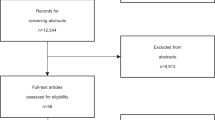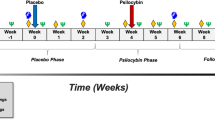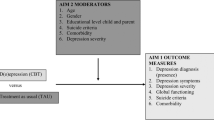Abstract
Effective psychotherapies for late-life depression are underutilized, mainly because of their complexity. “Engage” is a novel, streamlined psychotherapy that relies on neurobiology to identify core behavioral pathology of late-life depression and targets it with simple interventions, co-designed with community therapists so that they can be delivered in community settings. Consecutively recruited adults (≥60 years) with major depression (n = 249) were randomly assigned to 9 weekly sessions of “Engage” or to the evidence-based Problem-Solving Therapy (PST) offered by 35 trained community social workers and assessed by blind raters. “Engage” therapists required an average of 30% less training time to achieve fidelity to treatment than PST therapists and had one-third of the PST therapists’ skill drift. Both treatments led to reduction of HAM-D scores over 9 weeks. The mixed effects model-estimated HAM-D ratings were not significantly different between the two treatments at any assessment point of the trial. The one-sided 95% CI for treatment-end difference was (−∞, 0.07) HAM-D points, indicating a non-inferiority margin of 1.3 HAM-D points or greater; this margin is lower than the pre-determined 2.2-point margin. The two treatment arms had similar response (HR = 1.08, 95% CI (0.76, 1.52), p = 0.67) and remission rates (HR = 0.89, 95% CI (0.57, 1.39), p = 0.61). We conclude that “Engage” is non-inferior to PST. If disseminated, “Engage” will increase the number of therapists who can reliably treat late-life depression and make effective psychotherapy available to large numbers of depressed older adults.
This is a preview of subscription content, access via your institution
Access options
Subscribe to this journal
Receive 12 print issues and online access
$259.00 per year
only $21.58 per issue
Buy this article
- Purchase on Springer Link
- Instant access to full article PDF
Prices may be subject to local taxes which are calculated during checkout




Similar content being viewed by others
References
Maust DT, Kales HC, Blow FC. Mental health care delivered to younger and older adults by office-based physicians nationally. J Am Geriatr Soc. 2015;63:1364–72.
Nelson JC, Delucchi K, Schneider LS. Efficacy of second generation antidepressants in late-life depression: a meta-analysis of the evidence. Am J Geriatr Psychiatry. 2008;16:558–67.
Zivin K, Kales HC. Adherence to depression treatment in older adults: a narrative review. Drugs Aging 2008;25:559–71.
Driscoll HC, Karp JF, Dew MA, Reynolds CF 3rd. Getting better, getting well: understanding and managing partial and non-response to pharmacological treatment of non-psychotic major depression in old age. Drugs Aging 2007;24:801–14.
Arean PA, Raue P, Mackin RS, Kanellopoulos D, McCulloch C, Alexopoulos GS. Problem-solving therapy and supportive therapy in older adults with major depression and executive dysfunction. Am J psychiatry. 2010;167:1391–8.
Arean PA, Perri MG, Nezu AM, Schein RL, Christopher F, Joseph TX. Comparative effectiveness of social problem-solving therapy and reminiscence therapy as treatments for depression in older adults. J Consult Clin Psychol. 1993;61:1003–10.
Arean P, Hegel M, Vannoy S, Fan MY, Unuzter J. Effectiveness of problem-solving therapy for older, primary care patients with depression: results from the IMPACT project. Gerontologist. 2008;48:311–23.
Kiosses DN, Leon AC, Arean PA. Psychosocial interventions for late-life major depression: evidence-based treatments, predictors of treatment outcomes, and moderators of treatment effects. Psychiatr Clin North Am. 2011;34:377–401.
Arean PA, Alvidrez J, Barrera A, Robinson GS, Hicks S. Would older medical patients use psychological services? Gerontologist 2002;42:392–8.
Gum AM, Iser L, Petkus A. Behavioral health service utilization and preferences of older adults receiving home-based aging services. Am J Geriatr Psychiatry. 2010;18:491–501.
Raue PJ, Schulberg HC, Heo M, Klimstra S, Bruce ML. Patients’ depression treatment preferences and initiation, adherence, and outcome: a randomized primary care study. Psychiatr Serv. 2009;60:337–43.
Harvey AG, Gumport NB. Evidence-based psychological treatments for mental disorders: modifiable barriers to access and possible solutions. Behav Res Ther. 2015;68:1–12.
Goldman HH, Azrin ST. Public policy and evidence-based practice. Psychiatr Clin North Am. 2003;26:899–917.
Chambers DA. Advancing the science of implementation: a workshop summary. Adm Policy Ment Health. 2008;35:3–10.
Gehart D. The core competencies and MFT education: practical aspects of transitioning to a learning-centered, outcome-based pedagogy. J Marital Fam Ther. 2011;37:344–54.
Spruill J, Rozensky RH, Stigall TT, Vasquez M, Bingham RP, De Vaney Olvey C. Becoming a competent clinician: basic competencies in intervention. J Clin Psychol. 2004;60:741–54.
Lyon AR, Munson SA, Renn BN, Atkins DC, Pullmann MD, Friedman E, et al. Use of human-centered design to improve implementation of evidence-based psychotherapies in low-resource communities: protocol for studies applying a framework to assess usability. JMIR Res Protoc. 2019;8:e14990.
Alexopoulos GS, Arean P. A model for streamlining psychotherapy in the RDoC era: the example of ‘Engage’. Mol Psychiatry 2014;19:14–19.
Crabb RM, Areán PA, Hegel MT. Sustained adoption of an evidence-based treatment: a survey of clinicians certified in problem-solving therapy. Depress Res Treat. 2012;2012:986547–986547.
Russo SJ, Nestler EJ. The brain reward circuitry in mood disorders. Nat Rev Neurosci. 2013;14:609–25.
Rupprechter S, Stankevicius A, Huys QJM, Series P, Steele JD. Abnormal reward valuation and event-related connectivity in unmedicated major depressive disorder. Psychol Med. 2020;50:1–9.
Sharma A, Wolf D, Ciric R, Kable J, Moore T, Vandekar S, et al. Common dimensional reward deficits across mood and psychotic disorders: a connectome-wide association study. Am J Psychiatry. 2017;174:657–66.
Rupprechter S, Stankevicius A, Huys QJM, Steele JD, Series P. Major depression impairs the use of reward values for decision-making. Sci Rep. 2018;8:1–8.
Eppinger B, Hammerer D, Li SC. Neuromodulation of reward-based learning and decision making in human aging. Ann N Y Acad Sci. 2011;1235:1–17.
Dombrovski AY, Siegle GJ, Szanto K, Clark L, Reynolds CF, Aizenstein H. The temptation of suicide: striatal gray matter, discounting of delayed rewards, and suicide attempts in late-life depression. Psychol Med. 2012;42:1203–15.
Beck AT. The evolution of the cognitive model of depression and its neurobiological correlates. Am J Psychiatry. 2008;165:969–77.
Dai B, Li J, Chen T, Li Q. Interpretive bias of ambiguous facial expressions in older adults with depressive symptoms. PsyCh J. 2015;4:28–37.
Williams LM, Gatt JM, Schofield PR, Olivieri G, Peduto A, Gordon E. ‘Negativity bias’ in risk for depression and anxiety: brain-body fear circuitry correlates, 5-HTT-LPR and early life stress. NeuroImage 2009;47:804–14.
Dai Q, Wei J, Shu X, Feng Z. Negativity bias for sad faces in depression: an event-related potential study. Clin Neurophysiol: Off J Int Federation Clin Neurophysiol. 2016;127:3552–60.
Alexopoulos GS, Raue PJ, Kiosses DN, Seirup JK, Banerjee S, Arean PA. Comparing engage with PST in late-life major depression: a preliminary report. Am J Geriatr Psychiatry. 2015;23:506–13.
Maier S, Szalkowski A, Kamphausen S, Perlov E, Feige B, Blechert J, et al. Clarifying the role of the rostral dmPFC/dACC in fear/anxiety: learning, appraisal or expression? PloS ONE 2012;7:e50120.
Alexopoulos GS, Raue PJ, Kiosses DN, Mackin RS, Kanellopoulos D, McCulloch C, et al. Problem-solving therapy and supportive therapy in older adults with major depression and executive dysfunction: effect on disability. Arch Gen Psychiatry. 2011;68:33–41.
Hegel MT, Barrett JE, Oxman TE. Training therapists in problem-solving treatment of depressive disorders in primary care: lessons learned from the “Treatment Effectiveness Project”. Families, Syst, Health 2000;18:423–35.
First MB, Spitzer, RL, Williams, JBW, Gibbon, M. Structured clinical interview for DSM-IV - patient version (SCID-P). Washington: American Psychiatric Press; 1995.
Montgomery SA, Asberg M. A new depression scale designed to be sensitive to change. Br J Psychiatry: J Ment Sci. 1979;134:382–9.
Folstein MF, Folstein SE, McHugh PR. “Mini-mental state”. A practical method for grading the cognitive state of patients for the clinician. J Psychiatr Res. 1975;12:189–98.
Nakonezny PA, Carmody TJ, Morris DW, Kurian BT, Trivedi MH. Psychometric evaluation of the Snaith-Hamilton pleasure scale in adult outpatients with major depressive disorder. Int Clin Psychopharmacol. 2010;25:328–33.
Beck AT, Weissman A, Lester D, Trexler L. The measurement of pessimism: the Hopelessness Scale. J Consulting Clin Psychol. 1974;42:861–5.
Marin RS, Biedrzycki RC, Firinciogullari S. Reliability and validity of the apathy evaluation scale. Psychiatry Res. 1991;38:143–62.
Kanter JW, Mulick PS, Busch AM, Berlin KS, Martell CR. The Behavioral Activation for Depression Scale (BADS): psychometric properties and factor structure. J Psychopathol Behav. 2007;29:191–202.
Costa PT, McCrae RR. Neo personality inventory-revised (NEO PI-R). Odessa, FL: Psychological Assessment Resources. 1992;396.
Epping-Jordan JA, Ustun TB. The WHODAS-II: leveling the playing field for all disorders. WHO Ment Health Bull. 2000;6:5–6.
Hamilton M. A rating scale for depression. J Neurol Neurosurg Psychiatry. 1960;23:56–62.
Riordan Henry JAR. Methods to reduce placebo response in antidepressant treatment trials. J Clin Stud. 2018;10:46–49.
Lecrubier Y. How do you define remission? Acta Psychiatr Scand Supplementum. 2002:7–11.
Laird N, Ware J. Random-effects models for longitudinal data. Biometrics 1982;38:963–74.
Roderick JA. Little DBR. Statistical Analysis with Missing Data. 2nd ed. Hoboken, NJ: John Wiley & Sons; 2014.
Lee P, Shu L, Xu X, Wang CY, Lee MS, Liu CY, et al. Once-daily duloxetine 60 mg in the treatment of major depressive disorder: multicenter, double-blind, randomized, paroxetine-controlled, non-inferiority trial in China, Korea, Taiwan and Brazil. Psychiatry Clin Neurosci. 2007;61:295–307.
Mitchell C, Dwyer R, Hagan T, Mathers N. Impact of the QOF and the NICE guideline in the diagnosis and management of depression: a qualitative study. Br J Gen Pr. 2011;61:e279–289.
Barlow DH, Farchione TJ, Bullis JR, Gallagher MW, Murray-Latin H, Sauer-Zavala S, et al. The unified protocol for transdiagnostic treatment of emotional disorders compared with diagnosis-specific protocols for anxiety disorders: a randomized clinical trial. JAMA Psychiatry 2017;74:875–84.
Dias A, Azariah F, Anderson SJ, Sequeira M, Cohen A, Morse JQ, et al. Effect of a lay counselor intervention on prevention of major depression in older adults living in low- and middle-income countries: a randomized clinical trial. JAMA Psychiatry 2019;76:13–20.
Dombrovski AY, Mulsant BH, Houck PR, Mazumdar S, Lenze EJ, Andreescu C, et al. Residual symptoms and recurrence during maintenance treatment of late-life depression. J Affect Disord. 2007;103:77–82.
Kiosses DN, Alexopoulos GS. The prognostic significance of subsyndromal symptoms emerging after remission of late-life depression. Psychol Med. 2013;43:341–50.
Deng Y, McQuoid DR, Potter GG, Steffens DC, Albert K, Riddle M, et al. Predictors of recurrence in remitted late-life depression. Depression Anxiety. 2018;35:658–67.
Funding
This study was supported by R01 MH102252 (GSA), R01 MH102304 (PAA), P50 MH113838 (GSA), T32 MH019132 (GSA), and P50 MH115837 (PAA).
Author information
Authors and Affiliations
Corresponding author
Ethics declarations
Conflict of interest
GSA served on Advisory Board of Eisai and of Janssen Pharmaceuticals. He also served on the Speakers Bureaus of Allergan, Otsuka, and Takeda-Lundbeck. TDH is an employee of ‘Talkspace’. All other authors report no conflicts.
Additional information
Publisher’s note Springer Nature remains neutral with regard to jurisdictional claims in published maps and institutional affiliations.
Supplementary information
Rights and permissions
About this article
Cite this article
Alexopoulos, G.S., Raue, P.J., Banerjee, S. et al. Comparing the streamlined psychotherapy “Engage” with problem-solving therapy in late-life major depression. A randomized clinical trial. Mol Psychiatry 26, 5180–5189 (2021). https://doi.org/10.1038/s41380-020-0832-3
Received:
Revised:
Accepted:
Published:
Issue Date:
DOI: https://doi.org/10.1038/s41380-020-0832-3
This article is cited by
-
Biological factors influencing depression in later life: role of aging processes and treatment implications
Translational Psychiatry (2023)
-
Influences of dopaminergic system dysfunction on late-life depression
Molecular Psychiatry (2022)
-
Depressive symptom complexes of community-dwelling older adults: a latent network model
Molecular Psychiatry (2022)
-
Modifiable predictors of suicidal ideation during psychotherapy for late-life major depression. A machine learning approach
Translational Psychiatry (2021)



